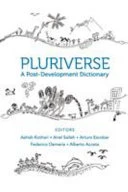Pluriverse: A Post-Development Dictionary

Blurb
Pluriverse: A Post-Development Dictionary contains over one hundred essays on transformative initiatives and alternatives to the currently dominant processes of globalized development, including its structural roots in modernity, capitalism, state domination, and masculinist values. It offers critical essays on mainstream solutions that 'greenwash' development and presents radically different worldviews and practices from around the world that point to an ecologically wise and socially just world.
Book summary
The book is divided into three sections: First, it reassesses the 'development' concept and reflects on its relation to the multiple crises of modernity. The second part is a critical review of innovations or 'crisis solutions' with origin in the Global North. The third and largest part of the book comprises the 'Peoples Pluriverse' and presents a multitude of worldviews and practices emerging from indigenous, pastoral communities, urban neighbourhoods, environmental, feminist and spiritual movements.

